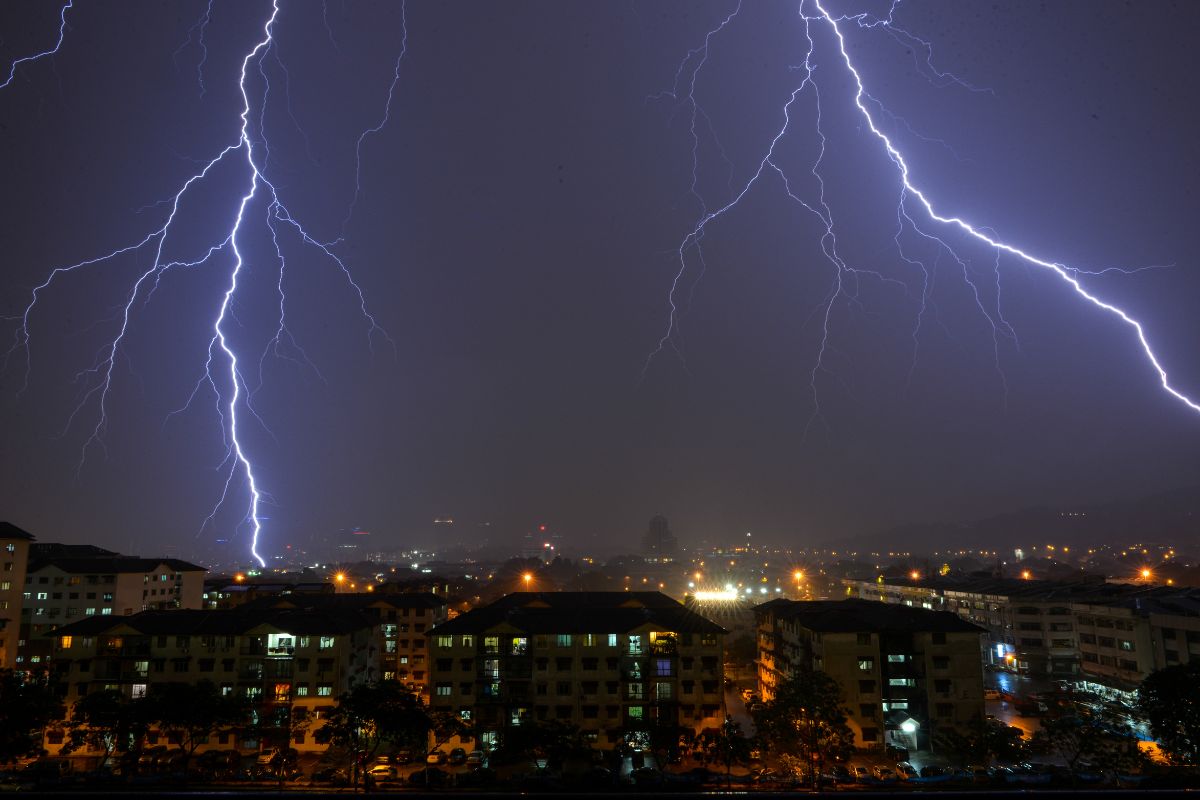A thunderstorm means that there will be a little or a lot of lightning. If lightning strikes close to where you are, or strikes you directly about 90% of people will survive. However, it’s best to be on the safe side, so here’s if it’s OK to shower during a thunderstorm, and the chances are something bad will happen.
As a general rule, it’s best to avoid taking a shower during a thunderstorm. The chances of a house getting struck by lightning is 0.001%. Or, about 1 in 70,000 each year. So it’s very rare. But, if lightning strikes your home or the ground nearby you can get electrocuted if you’re taking a shower.
Today, I will cover how likely it is that something bad will happen if you are showering during a thunderstorm, and what lightning will do to your shower if it strikes your home.
What Happens to Your Shower if Your House Is Struck by Lightning

Most homes in the USA have either a gas-powered hot water cylinder or an electric hot water cylinder. When lightning strikes your home directly, or the ground close to your home the electricity can flow through your entire home. This will typically cause too much electricity to flow through appliances. When this happens the circuits get too hot and can melt or blow.
When there is a thunderstorm, a house is a safer place to be because it’s much less likely you will get struck by lightning directly. And are generally safer from trees falling as a result of strong winds, or trees getting struck by lightning.
Therefore, if lightning strikes your home or the ground close to your home it will generally do nothing to a gas-powered hot water cylinder. But, it can blow an electric hot water cylinder. And it will cause it to stop working. Luckily, the water in a hot water cylinder will stay hot for a day or two if power is cut to it.
Taking a shower isn’t recommended during a thunderstorm
But, when lightning strikes your home, or the ground nearby a lot of electricity can come through your home. If you are touching something that conducts electricity.
For example, if you are holding a smartphone that is plugged in and getting charged, then electricity from the lightning will go through you. This can cause you to be electrocuted.
However, being electrocuted is different from being struck by lightning. A lightning strike only provides electricity for a very short amount of time. Fractions of a second. Whereas, where electrocution causes harm is when the electricity never stops flowing.
In fact, according to Weather.gov, 90% of people who are struck by lightning survive (source). However, many people struck by lightning sustain injuries. The location where the lightning is striking during a thunderstorm varies.
For example, you can look out your windows and see lightning strike in the distance, very far from your house. In other cases, you can see it striking very close. Another way of knowing how far lightning is, is to count how long it takes in between when the lightning strikes and when you hear the thunder.
This isn’t always possible if there is a lot of lightning. But, overall if you count in seconds between when you see the lightning and when you hear the thunder you can take this number and divide it by 5. Doing, so will give you the distance in miles the lightning struck from where you are.
For example, if you could 5 seconds, it means the lightning struck 1 mile from your home. When lightning is striking very close to your home, you should be more careful, and wait until the lightning is further away or the lightning storm has passed before taking a shower.
How Likely Are You Get Struck by Lightning in a Shower
When there is a thunderstorm it’s best to err on the side of caution. Taking a shower a few times a day is common for most people. So, here’s how likely it is that to get struck by lightning in the shower.
On average, the chance of being struck by lightning in a shower in a year is 1 in 1 million. Or, 0.0001%. If a window is open the lightning can come in the window and strike you directly. But, it’s much more likely it will strike the top of your house, or the ground near your house.
Lightning will take the easiest path to the ground, which is the reason buildings have lightning rods. But, taking a shower creates a complete circuit and if lightning strikes your house there’s a very high chance you will get electrocuted in the shower (source).
However, because the overall chance of your house getting struck by lightning is very low the overall chance of getting electrocuted by a lightning strike that hits your home is also very low.
What Happens if You Take a Shower During a Thunderstorm
As you may know, water conducts electricity, and when you are taking a shower electricity could travel through the shower head, through the water, and electrocute you. However, here’s whether there is any risk, or, if anything bad happens in you take a shower during a thunderstorm.
Overall, nothing bad happens if you take a shower during a thunderstorm. If lightning were to strike your home, or the ground very close to your home, there is a chance that you could get electrocuted. But, the chances of it happening are incredibly low, 0.0001%.
The main risks during a thunderstorm are also caused by the strong winds and lots of rain. These can cause trees to fall. Or large branches to break off that can land on top of you. The chances of lightning striking you are so low, that it’s not really worth worrying about.
But, if you notice lightning VERY close to your home, it’s a good idea to wait until the lightning stops occurring so close, or the thunderstorm passes. Just to be on the safe side.

Amos Christen graduated with a bachelor’s degree in Interior Design from Drexel University — Philadelphia, PA. Since 2003, Amos has worked with top interior design professionals in this area, including architects and interior/graphic/lighting designers. As a skilled interior designer, Amos Christen is highly versed in fine arts and crafts and uses that to supplement his main area of expertise. He often publishes articles related to home décor on several websites, including Sprucetoilets.com, Sprucebathroom.com, and Mybesuitedhome.com. He also contributes to leading interior design magazines.
